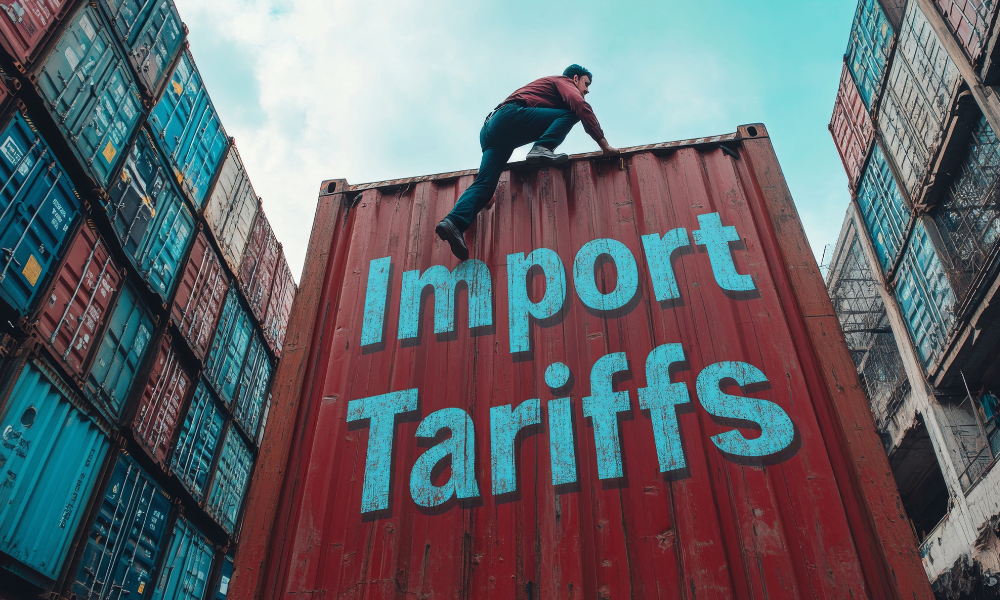

by Zoe Tillman and Erik Larson
Donald Trump can continue to enforce his global tariffs for now, a federal appeals court held in a win for the president on one of his signature economic policies.
The order Tuesday by the US Court of Appeals for the Federal Circuit extends an earlier, short-term reprieve for the administration as it presses a challenge to a lower court ruling last month that blocked the tariffs. The Justice Department had argued that US officials’ concerns about ongoing trade negotiations outweighed the economic harm claimed by the small businesses that sued.
The Washington-based court put the case on an expedited track, citing the “issues of exceptional importance” at stake, and scheduled arguments for July 31. The court didn’t offer a detailed reason for siding with the administration at this stage, indicating in the order that the government had met its burden for showing that keeping the lower court’s injunction on hold was “warranted.” No judge noted a dissent.
The ruling comes as negotiators for the US and China reached a preliminary agreement to de-escalate trade tensions. Representatives of the world’s two largest economies announced the accord in the second day of talks in London over exports of key tech and industrial goods. Trump has portrayed tariffs as critical to leveling the playing field for American businesses and workers amid chronic trade deficits.
The Trump administration asked the appeals court to step in after the US Court of International Trade last month ruled that Trump had misused an emergency law to implement the tariffs. Unless the challengers request swift intervention by the US Supreme Court, the levies will stay in place for at least another month, if not longer, as the rest of the legal fight plays out before the Washington-based appellate court. Whoever loses the next round of the case before the Federal Circuit could then ask the high court justices to weigh in.
Tuesday’s order comes a month before Trump’s own 90-day pause on most of his sweeping “reciprocal” tariffs is set to expire. On July 9, US tariff rates are set to increase drastically for many nations, absent trade deals or a further extension. Goods from the European Union, for instance, are facing a 50% levy.
Companies led by New York wine importer V.O.S. Selections Inc. claimed that letting the tariffs go into effect would lead to much higher costs and lower sales, with some of them likely to end up in bankruptcy. The administration argued that blocking the tariffs would disrupt US diplomacy and intrude upon the president’s power to conduct foreign affairs.
A dozen Democratic-led states also sued the administration over the tariffs.
Jeffrey Schwab, senior counsel and director of litigation at the Liberty Justice Center, which represents the private plaintiffs, said in a statement that they were disappointed but glad the Federal Circuit set a fast schedule and would have the full court hear the fight over Trump’s use of the International Emergency Economic Powers Act.
“It’s important to note that every court to rule on the merits so far has found these tariffs unlawful, and we have faith that this court will likewise see what is plain as day: that IEEPA does not allow the president to impose whatever tax he wants whenever he wants,” Schwab said.
A White House spokesperson and a representative of the Oregon attorney general’s office, which led the state coalition that sued, did not immediately respond to requests for comment.
Tariffs covered by the trade court ruling include Trump’s global 10% levy, his April 2 “Liberation Day” tariffs and measures targeting China, Canada and Mexico over fentanyl trafficking. The president claimed authority to impose those tariffs under the 1977 emergency economic powers law.
A three-judge panel of the trade court ruled last month that law didn’t give the president unbridled tariff power. The court also took issue with Trump’s claims of “emergencies” over trade deficits and drug-trafficking. In their decision, the judges said government lawyers actually undercut that position by arguing that tariffs were needed as negotiating tools.
“The government’s ‘pressure’ argument effectively concedes that the direct effect of the country-specific tariffs is simply to burden the countries they target,” wrote the panel, which includes judges appointed by Trump, Barack Obama and Ronald Reagan.
Trump’s tariffs on steel, aluminum and automobiles were imposed under a different law, so were not affected by the trade court ruling. Administration officials have often publicly downplayed the impact of the May 28 decision by claiming that most of its tariffs can be imposed by other means.
Global markets have fluctuated wildly since Trump announced the so-called reciprocal levies in a sweeping executive order on April 2. Since then, trillions of dollars in market value have been shed and regained amid weeks of delays, reversals and announcements about potential trade deals, particularly with China.
The case is V.O.S. Selections v. Trump, 25-1812, US Court of Appeals, Federal Circuit.
Copyright Bloomberg News

A new proposal could end the ban on promoting client reviews in states like California and Connecticut, giving state-registered advisors a level playing field with their SEC-registered peers.

Some in the industry say that more UBS financial advisors this year will be heading for the exits.

The Wall Street giant has blasted data middlemen as digital freeloaders, but tech firms and consumer advocates are pushing back.

Research reveals a 4% year-on-year increase in expenses that one in five Americans, including one-quarter of Gen Xers, say they have not planned for.

Raymond James also lured another ex-Edward Jones advisor in South Carolina, while LPL welcomed a mother-and-son team from Edward Jones and Thrivent.
Orion's Tom Wilson on delivering coordinated, high-touch service in a world where returns alone no longer set you apart.
Barely a decade old, registered index-linked annuities have quickly surged in popularity, thanks to their unique blend of protection and growth potential—an appealing option for investors looking to chart a steadier course through today's choppy market waters, says Myles Lambert, Brighthouse Financial.
